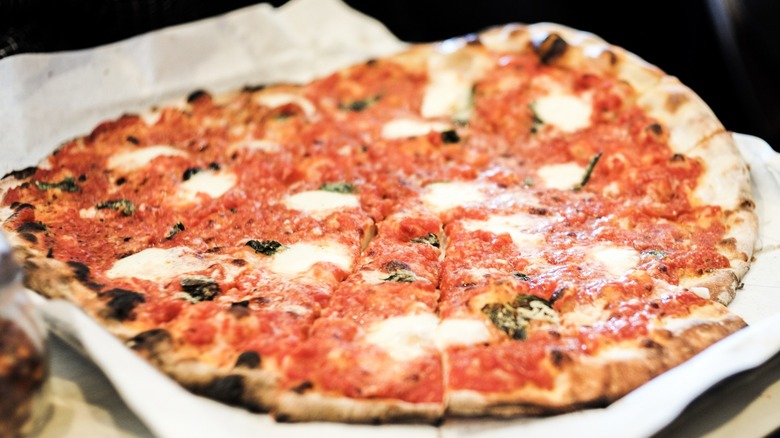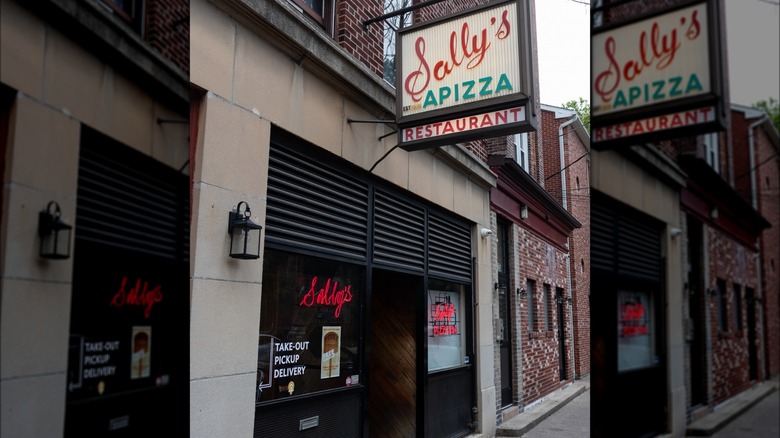What Is New Haven-Style Pizza, And Why Is It Called 'Apizza'?
New York, Detroit, Neapolitan, Chicago, Sicilian — these are all widely-known styles of pizza, each with a unique style of crust, toppings, and other unique traits. However, you may not be familiar with New Haven-style pizza, or "apizza" (pronounced "ah-beetz"). Hailing from New Haven, Connecticut, this style of pizza gives others a run for their money.
Distinguished by a delightfully crispy yet chewy crust that is expertly charred, as well as a distinct lack of mozzarella cheese, the foundation of a New Haven pizza is close in style to traditional Neapolitan pizzas. The difference is that New Haven pies use sturdier bread flour in order to keep the slices from collapsing, and the pies are cooked lower and slower. While Neapolitan pizza is famously baked in ovens that reach over 1,000 degress Fahrenheit, so the pizza can be cooked in as short as one minute, New Haven pizza is baked in the same type of oven, but further away from the heat source. The pies cook at around 600 to 650 degrees Fahrenheit for roughly five to 12 minutes.
The classic toppings for apizza are crushed Italian tomatoes, Pecorino Romano cheese, and olive oil, but you can also get your pizza topped with other toppings like sausage, white clams with bacon (which is a local specialty), and vegetables. The name "apizza" is a nod to the dialect of early Italian immigrants who settled in New Haven.
How apizza came to be in New Haven
"Apizza" wasn't always a uniquely New Haven term. Italian immigrants settled in several nearby communities at the turn of the century, including Manhattan, Brooklyn, Delaware and parts of Massachusetts, and many of them (especially those from Naples) pronounced the word "pizza" in the same manner. Some restaurants even included "apizza" in their names. While many areas have moved on to calling their local pies just "pizza," New Haven has held on to their roots, and if you take a visit, you can come across pizza restaurants like Sally's Apizza.
As for the use of coal-fired pizza ovens, in the 1920s and 30s, coal was an economical source of heat, and so many pizza restaurants used it to heat their ovens. These ovens contributed to the smoky flavor and blistered crust that is a defining trait of New Haven pizza. The lack of cheese also goes way back. One of the oldest pizzerias in New Haven is Pepe's, which opened in 1925 and still churns out pies today. Founder Frank Pepe was pivotal in establishing the topping structure of apizza.
Pepe's restaurant didn't have a refrigerator in its early days, so mozzarella cheese wasn't an option. Pepe instead stocked his shelves with toppings that didn't need to be kept cold, like canned tomatoes, hard grated cheese, garlic, and anchovies. In the 1930s, Pepe's nephew Salvatore "Sally" Consiglio opened the aforementioned Sally's Apizza, which is also still in business and is considered the gold standard for New Haven-style pizza.
New Haven pizza today
Although it may not be traditional, mozzarella cheese (nicknamed "mootz" in New Haven) is available as a topping at Sally's, Pepe's, and many other similar pizzerias. If you don't specifically ask for it, don't be surprised when your pie arrives without cheese. Luckily, the crust on a New Haven pie is usually tasty enough to go without cheese. Another defining element of these pizzas is the long fermentation process for the dough. It's not unusual for pizza makers to let their dough rest overnight in the refrigerator, then let it come back to room temperature before it's shaped and baked. This method both develops the flavor and helps in producing that signature chewy texture.
While the style may be born and bred on the coast of Connecticut, New Haven pizza is becoming more popular. Locals, visitors, and traveling pizza connoisseurs have spread the word of this phenomenal style of pizza not just across the United States, but across the pond as well. Just outside of London, England in the town of St. Albans is Gracey's Pizza, whose style is directly inspired by New Haven. Lala's Brooklyn Apizza has even brought the style to New York. If a spot for New Haven pizza doesn't yet exist in your town, keep your eyes "apeeled."



